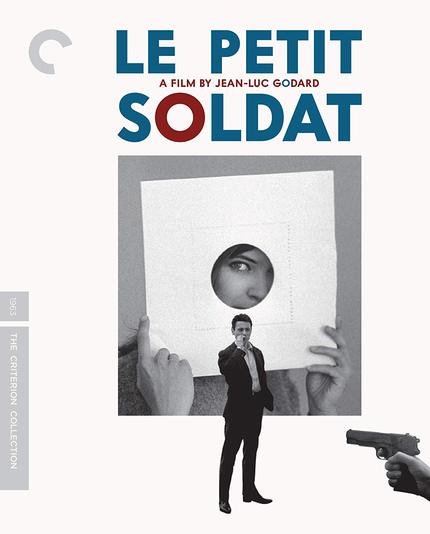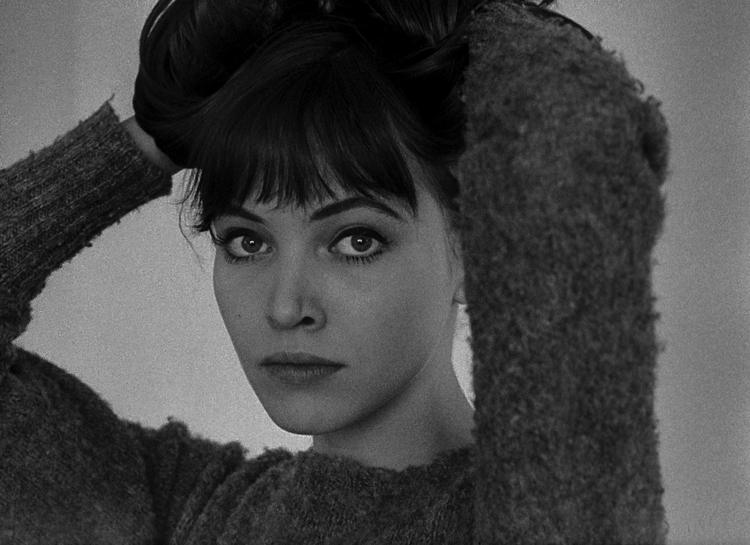Blu-ray Review: Godard's LE PETIT SOLDAT Marches onto Criterion Blu-ray
Jean-Luc Godard's once-censored political espionage tale stars Anna Karina and Michel Subor.

“Cinema is truth at 24 frames per second.“
Any self-respecting student of deeper film history (casual or otherwise) has no doubt come upon the above quote credited to Jean-Luc Godard, perhaps multiple times. It’s quick, snappy, and affirming nature makes it awfully hard for authors, critics, and presenters to resist. It’s ironic then, that the qualities of “snappy, quick, and affirming”, are not exactly what Godard himself is known for.
It turns out, anyhow, that this film, Le petit soldat, is that quote’s original source. While snapping off photos of the beguiling Veronica Dreyer (a fresh-faced Anna Karina, having already cast a spell on Godard himself) in her sparse Geneva apartment, French deserter Bruno Forestier (Michel Subor) quips, “Photography is truth. Cinema is truth at 24 frames per second”. As Nicholas Elliott points out in his foldout essay that’s included with the Blu-ray, the little bit of additional prologue, coupled with the moment said, contextualizes and clarifies indeed.
Filmed shortly after 1960’s Breathless- The debut that would that would prove to be Godard’s International breakout success- Le petit soldat quickly establishes itself as a different thing entirely. The hindsight of history being our guide, such a pronounced shifting of gears should come as no surprise. Godard, still alive and active at the time of this writing, has had more distinct phases, shifts, and comebacks than most legacy pop singers. Even at the crux of his mind-bogglingly prolific 1960s heyday, the filmmaker clearly thrived on the notion of being impossible to pin down. The great film critic Manny Farber, infamously threw up his hands at the self-aggrandizing fluidity of it all, declaring Godard’s zoo of “truculently formulated beasts… that includes a pink parakeet (A Woman Is a Woman), a diamond-black snake (Contempt), a whooping crane (Band of Outsiders).” What animal then, one is tempted to ask, would the overlooked Le petit soldat be…? For Farber, probably some kind of termite. Hidden in the wood, and beginning the attempted, instinctual process of devouring the superstructure…
Censored by the French government for being too much of a political hot potato, Le petit soldat didn’t even see the light of day until after the release of Godard’s fourth film, circa 1963. Dealing with, and at times, deeply questioning of France’s actions and motivations in regard to the French-Algerian War of 1954 to 1962, it deals head-on with very contemporaneous issues of torture (depicted in the film), and goes as far as to have a character predict that France will lose the war, resulting in a decolonized Algeria. (Which was the eventual result).
In a vintage interview from the early 1960s, Godard says that all of his films following his first film, Breathless, are highly influenced by the real world. While that’s not a point of debate, there remains a kind of delicious irony in the fact that while Le petit soldat is paving the way for a career’s-worth of politically driven films, it might also be the closest the filmmaker dances to mainstream suspense, and even action. Though deeply motivated by the realities the war, the film’s many moments of assassination chases and eye-widening moments of near-death are worthy of the then-rising trend of Cold War spy intrigue. Bruno’s chronic hesitancy to pull the trigger, though, is rooted in a deeply palpable psychological disconnect from his own clashing notions of patriotism and justice. Amid the real-world mundanity of neon signs, blah hotel rooms and newspaper stands lies an ongoing moral dilemma. Or more likely, an awakening. Somewhere, John le Carré might’ve been looking on proudly, even inspired.
In France, at least at the time, the populace was “terribly logical“. That’s according to lead actor, Michel Subor, in his own vintage interview, also included on the disc. But, as Subor points out, logic isn’t what artists need. Godard, meanwhile, in his own way, wields a fundamental understanding of cinema mystery. Whether he’s been successful at all in channeling his artistically exploratory nature into comparable opportunities for actors, however, is debatable at best. Godard, in his decades of morphing experimentation with this medium he loves so much, has left in his wake a broad trail of broken relationships- many with actors. Perhaps even more with his noted female muses, the first and most prominent being Anna Karina, whom he promptly married and took a patriarchal ownership of on the heels of Le petit soldat. All in all, she would brighten the screen for seven of his movies.
Director of Photography Raoul Coutard- as essential a talent in the French New Wave as Godard, Karina or its other major filmmaker, François Truffaut- had a stunning way of making inexpensive black and white filmstock cast a certain engaging allure. Godard’s films in particular needed this flourish, as aloof (“logical”?) as they all are. Criterion’s new Blu-ray edition of Le petit soldat does Coutard’s work splendid justice. Amid a nonstop tide of bygone French political strife (much of which was old news by the time the film finally saw release) and lots of affectless Godard-ian voiceover narration, Coutard’s effortless-but-not-really-effortless handheld execution goes a long way in keeping our attention.
In terms of how Le petit soldat fares in regard to “the Criterion treatment”, one can’t help but notice that, for such a noteworthy French New Wave entry finally making its way to the hallowed collection, there’s not a lot of content offered to dig into beyond the movie itself. It is, however, understandable that for a film that was buried at its completion, there wouldn’t be much in the way of relevant vintage interviews or promotion. As previously stated, the world- and Godard- had moved on by the time Le petit soldat did see a faint light of day. What Criterion did manage to unearth are two very brief interviews, one with Godard and one with Subor, as well as a half-hour English-language radio interview with Godard. The lone voice of current contextualization, though, belongs to the aforementioned essayist Nicholas Elliott. While a newly created video essay and/or historian interview would’ve been much appreciated, one can also appreciate the almost-rebellious sparsity of this release. It is, if nothing else, synchronous in presentation with Le petit soldat itself.
For many, when they think of the Criterion Collection, this is the very type of title that likely comes to mind first. This long-in-coming release of Le petit soldat lives up to the company’s long-established high standards of audio/visual presentation. Its packaging and graphic design may not win any year-end awards from diehard Criterion fans (yes, such awarding exists), but it is undeniably true to the film it represents. So too is Le petit soldat undeniably true to the country, time, and filmmaker it represents.
Le Petit Soldat
Director(s)
- Jean-Luc Godard
Writer(s)
- Jean-Luc Godard
Cast
- Michel Subor
- Anna Karina
- Henri-Jacques Huet
- Paul Beauvais








